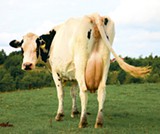Tail of woe
by J. Adrian Stanley | The Colorado Springs Independent

Cow uncut: Soon you could sign to protect that tassel.
The Humane Society of the United States, animal rights activists, farmers and ranchers such as Mike Callicrate are working to get an initiative on the ballot that would ban bovine tail docking. That’s the practice of removing up to two-thirds of a cow’s tail, either by whacking it with a blade, or, more commonly, fastening a tight band around the tail to restrict blood flow, causing the tail to fall off.
Docking is increasingly unpopular, particularly in Colorado. It can be painful for cows, and it prevents them from using their tails to shoo away flies. There doesn’t appear to be a scientific reason to dock. Experts say it started in New Zealand decades ago, after studies showed it might lead to cleaner milk, because the tassel on a cow’s tail can get caked with feces and mud. Later studies, however, didn’t show a correlation.
Temple Grandin, the noted professor of animal science at Colorado State University, tells the Indy she doesn’t believe in tail-docking cows, especially when any problems can be eliminated by trimming the tassel. But she also hasn’t come out in support of a ban. She says she prefers to see changes in livestock treatment come from consumer and industry pressure, and she’s worried that a law might not be worded narrowly enough.
A fuzzy law — and some of the proposed initiatives are fuzzy — could draw all sorts of agricultural practices into question, from castration to slaughter. That’s worried some farmers and agricultural advocates. But that’s not the only issue raised by this proposal. Others include the role of government, the rights of animals, and even the future of the American cowboy.
Years in the making
Jacquelyn Pyun, Colorado state director of the Humane Society of the United States, says her organization began working on a tail docking ban in 2008.
“We believe this is animal cruelty,” she says. “So we’re going to take the necessary steps to see [it] banned.”
An initiative requires 86,105 valid signatures, by Aug. 4, to get on the ballot. Pyun says that shouldn’t be a problem — the Society has tens of thousands of active volunteers in Colorado.
But passing an initiative wasn’t the way the Society initially envisioned this. Pyun says her organization had conversations with the Department of Agriculture, the governor’s office, farmers, industry groups, state representatives and senators. In 2013, Rep. Steve Lebsock, D-Thornton, introduced a bill that would have banned docking dairy cows’ tails unless the procedure was performed by a veterinarian using anesthesia. The bill was killed before it could reach the Senate.
While many organizations have come out against tail docking — including the National Milk Producers Federation and the American Veterinary Medical Association — others, like the Colorado Farm Bureau, opposed a ban.
Chad Vorthmann, executive vice president of the Bureau, says he thinks industry and consumers should decide agriculture practices, not lawmakers. “[It] doesn’t make us look like a very dairy-friendly state,” he says.
Chris Kraft, a dairy farmer in northeastern Colorado who doesn’t dock his cows’ tails, also opposed the ban. “It’s the beginning of a slippery slope, to where we’re going to have codified animal practices,” he says.
A few farms in Colorado still tail-dock, most notably Empire Dairy in Wiggins. And Kraft says docking can make sense on certain farms. He says he knows of one farmer who started docking after a worker was injured trying to trim a cow’s tassel.
Change of heart
Callicrate, who raises cattle for beef, sees it differently.
“It’s simply a way to allow [cows] to be in a dirty condition and have less manure at the milking line,” he says.
Callicrate is the rancher and activist behind Callicrate Beef, which he produces hormone-free in Kansas and sells locally via Ranch Foods Direct. In the ranching world, he’s probably best known for an early invention: the Callicrate Bander, a tool that’s used to “humanely” castrate animals, and for other agricultural purposes — like docking tails. His opponents have noted that irony.
Callicrate says his thinking has evolved, especially after he became involved with the Humane Society of the United States a few years ago. He says he now sees tail docking not only as a cruel practice but a shortcut, like so many others, that has given big agricultural producers an unfair advantage.
“It’s just a way to try to level the field a little bit between industrial ag and the alternative family farm agriculture,” he says of a ban. “In the industrial ag world … the biggest cheater wins. And that’s where it ends up: A sow in a gestation crate, a chicken in a battery cage and a cow losing her tail in a dairy.”












